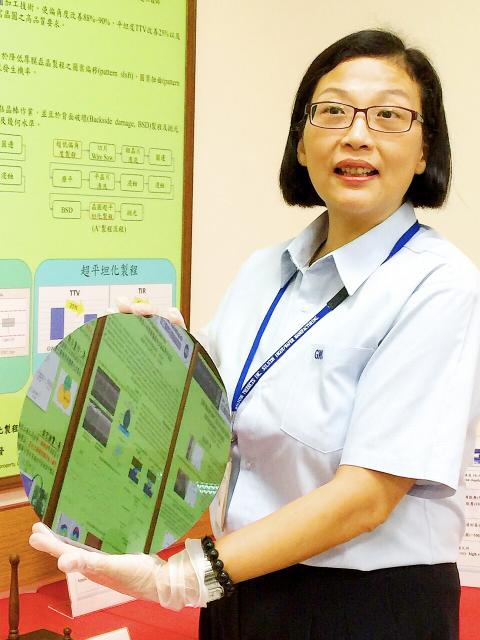GlobalWafers Co (環球晶圓) shares tumbled 9.51 percent yesterday as bigger rival SUMCO Corp’s newly unveiled capacity expansion plan gave jitters to cautious investors.
GlobalWafers, the world’s No. 3 semiconductor silicon wafer supplier, saw its shares take a nosedive to NT$242.5 yesterday, eclipsing the company’s strong financial performance in the first half this year.
SUMCO on Monday said that it planned to invest ¥43.6 billion (US$396 million) on building a new 12-inch wafer fab in Japan to help mitigate supply constraints.

Photo: Hung Yu-fang, Taipei Times
The Japanese company expects the new fab to start operation in the first half of 2019, which should help SUMCO add 110,000 12-inch silicon wafers a month to its existing capacity, according to a company statement posted on its Web site.
“We expect the impact will not be significant as the industry is entering its ‘supercycle,’” GlobalWafers vice president Lee Chung-wei (李崇偉) said by telephone.
“Investors have overreacted [to SUMCO’s expansion plan],” he said.
The capacity increase from SUMCO accounts for merely 2 percent of market demand for 5.5 million 12-inch wafers per month, Lee said.
“At present, market demand greatly exceeds supply, which we have not seen in more than a decade. Our capacity is fully booked even for next year,” Lee said.
SUMCO’s announcement also weighed on shares of GlobalWafers’ local peers Formosa SUMCO Technology Corp (台塑勝高科技) and Wafers Corp (合晶科技), which saw their stock prices plunge 3.16 percent and 4.21 percent to NT$92 and NT$20.5 respectively.
GlobalWafers expects the supply crunch to extend into the next two years due to limited new supply, shrugging off concerns over a potential supply glut due to SUMCO’s new fab.
The world’s major chipmakers, including Taiwan Semiconductor Manufacturing Co (台積電) and Samsung Electronics Co, have announced large-scale capacity expansion plans, as market demand is to increase by 1 million wafers a month by 2019, outgrowing supply, Lee said.
In spite of strong customer demand, GlobalWafers said it is in no rush to build any new plant as its priority is to integrate its resources and capacity with SunEdison Semiconductor Ltd, a US-based silicon wafer maker acquired by GlobalWafers last year.
“Many new 12-inch [finished wafer] production lines will ramp up in the next two to three years worldwide, especially in China, and this kind of booming market will definitely make the [raw] wafer supply much tighter,” GlobalWafers said in a statement on Monday.
Strong demand has helped drive the company’s net profit in the first half. Net profit soared 1.21 times to NT$1.64 billion (US$54.3 million) in the first two quarters this year, in comparison with NT$740 million in the same period last year, according to the company’s financial statement.
That translated into earnings per share of NT$4.17, up from NT$2 last year.

PATENTS: MediaTek Inc said it would not comment on ongoing legal cases, but does not expect the legal action by Huawei to affect its business operations Smartphone integrated chips designer MediaTek Inc (聯發科) on Friday said that a lawsuit filed by Chinese smartphone brand Huawei Technologies Co (華為) over alleged patent infringements would have little impact on its operations. In an announcement posted on the Taiwan Stock Exchange, MediaTek said that it would not comment on an ongoing legal case. However, the company said that Huawei’s legal action would have little impact on its operations. MediaTek’s statement came after China-based PRIP Research said on Thursday that Huawei filed a lawsuit with a Chinese district court claiming that MediaTek infringed on its patents. The infringement mentioned in the lawsuit likely involved

Taipei is today suspending work, classes and its US$2.4 trillion stock market as Typhoon Gaemi approaches Taiwan with strong winds and heavy rain. The nation is not conducting securities, currency or fixed income trading, statements from its stock and currency exchanges said. Authorities had yesterday issued a warning that the storm could affect people on land and canceled some ship crossings and domestic flights. Taiwan Semiconductor Manufacturing Co (TSMC, 台積電) expects its local chipmaking fabs to maintain normal production, the company said in an e-mailed statement. The main chipmaker for Apple Inc and Nvidia Corp said it has activated routine typhoon alert

GROWTH: TSMC increased its projected revenue growth for this year to more than 25 percent, citing stronger-than-expected demand for AI devices and smartphones The Taiwan Institute of Economic Research (TIER, 台灣經濟研究院) yesterday raised its forecast for Taiwan’s GDP growth this year from 3.29 percent to 3.85 percent, as exports and private investment recovered faster than it predicted three months ago. The Taipei-based think tank also expects that Taiwan would see a 8.19 percent increase in exports this year, better than the 7.55 percent it projected in April, as US technology giants spent more money on artificial intelligence (AI) infrastructure and development. “There will be more AI servers going forward, but it remains to be seen if the momentum would extend to personal computers, smartphones and

Catastrophic computer outages caused by a software update from one company have once again exposed the dangers of global technological dependence on a handful of players, experts said on Friday. A flawed update sent out by the little-known security firm CrowdStrike Holdings Inc brought airlines, TV stations and myriad other aspects of daily life to a standstill. The outages affected companies or individuals that use CrowdStrike on the Microsoft Inc’s Windows platform. When they applied the update, the incompatible software crashed computers into a frozen state known as the “blue screen of death.” “Today CrowdStrike has become a household name, but not in